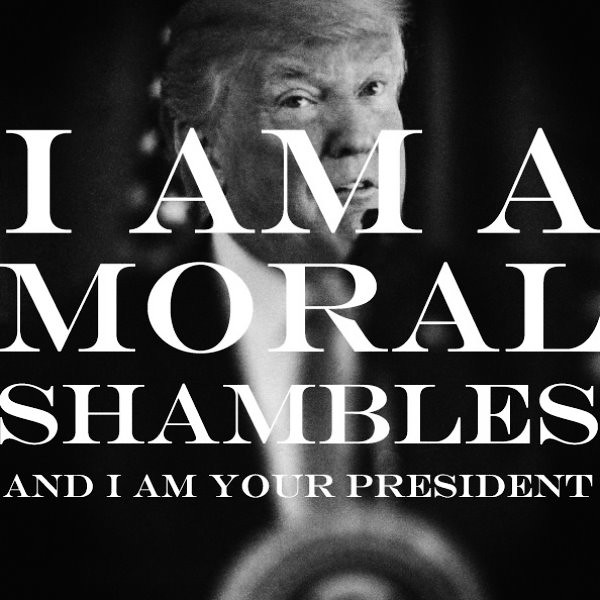
Denouncing Nazis and the KKK and violent white supremacists by those names should not be a difficult thing for a president to do, particularly when those groups are the instigators and proximate cause of violence in an American city, and one of their number has rammed his car through a group of counter-protestors, killing one and injuring dozens more. This is a moral gimme — something so obvious and clear and easy that a president should almost not get credit for it, any more than he should get credit for putting on pants before he goes to have a press conference.
And yet this president — our president, the current President of the United States — couldn’t manage it. The best he could manage was to fumble through a condemnation of “many sides,” as if those protesting the Nazis and the KKK and the violent white supremacists had equal culpability for the events of the day. He couldn’t manage this moral gimme, and when his apparatchiks were given an opportunity to take a mulligan on it, they doubled down instead.
This was a spectacular failure of leadership, the moral equivalent not only of missing a putt with the ball on the lip of the cup, but of taking out your favorite driver and whacking that ball far into the woods. Our president literally could not bring himself to say that Nazis and the KKK and violent white supremacists are bad. He sorely wants you to believe he implied it. But he couldn’t say it.
To be clear, when it was announced the president would address the press about Charlottesville, I wasn’t expecting much from him. He’s not a man to expect much from, in terms of presidential gravitas. But the moral bar here was so low it was on the ground, and he tripped over it anyway.
And because he did, no one — and certainly not the Nazis and the KKK and the violent white supremacists, who were hoping for the wink and nod that they got here — believes the president actually thinks there’s a problem with the Nazis and the KKK and the violent white supremacists. If he finally does get around to admitting that they are bad, he’ll do it in the same truculent, forced way that he used when he was forced to admit that yeah, sure, maybe Obama was born in the United States after all. An admission that makes it clear it’s being compelled rather than volunteered. The Nazis and the KKK and the violent white supremacists will understand what that means, too.
Our president, simply put, is a profound moral shambles. He’s a racist and sexist himself, he’s populated his administration with Nazi sympathizers and white supremacists, and is pursuing policies, from immigration to voting rights, that make white nationalists really very happy. We shouldn’t be surprised someone like him can’t pass from his lips the names of the hate groups that visited Charlottesville, but we can still be disappointed, and very very angry about it. I hate that my baseline expectation for the moral behavior of the President of the United States is “failure,” but here we are, and yesterday, as with previous 200-some days of this administration, gives no indication that this baseline expectation is unfounded.
And more than that. White supremacy is evil. Nazism is evil. The racism and hate we saw in Charlottesville yesterday is evil. The domestic terrorism that happened there yesterday — a man, motivated by racial hate, mowing down innocents — is evil. And none of what happened yesterday just happened. It happened because the Nazis and the KKK and the violent white supremacists felt emboldened. They felt emboldened because they believe that one of their own is in the White House, or at least, feel like he’s surrounded himself with enough of their own (or enough fellow travelers) that it’s all the same from a practical point of view. They believe their time has come round at last, and they believe no one is going to stop them, because one of their own has his hand on the levers of power.
When evil believes you are one of their own, and you have the opportunity to denounce it, and call it out by name, what should you do? And what should we believe of you, if you do not? What should we believe of you, if you do not, and you are President of the United States?
My president won’t call out evil by its given name. He can. But he won’t. I know what I think that means for him. I also know what I think it means for the United States. And I know what it means for me. My president won’t call out evil for what it is, but I can do better. And so can you. And so can everybody else. Our country can be better than it is now, and better than the president it has.
